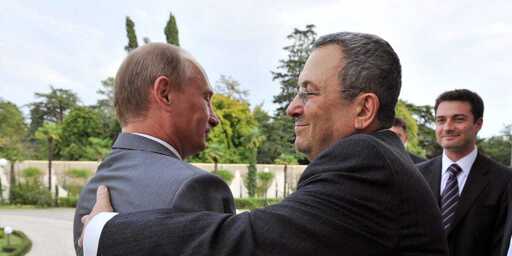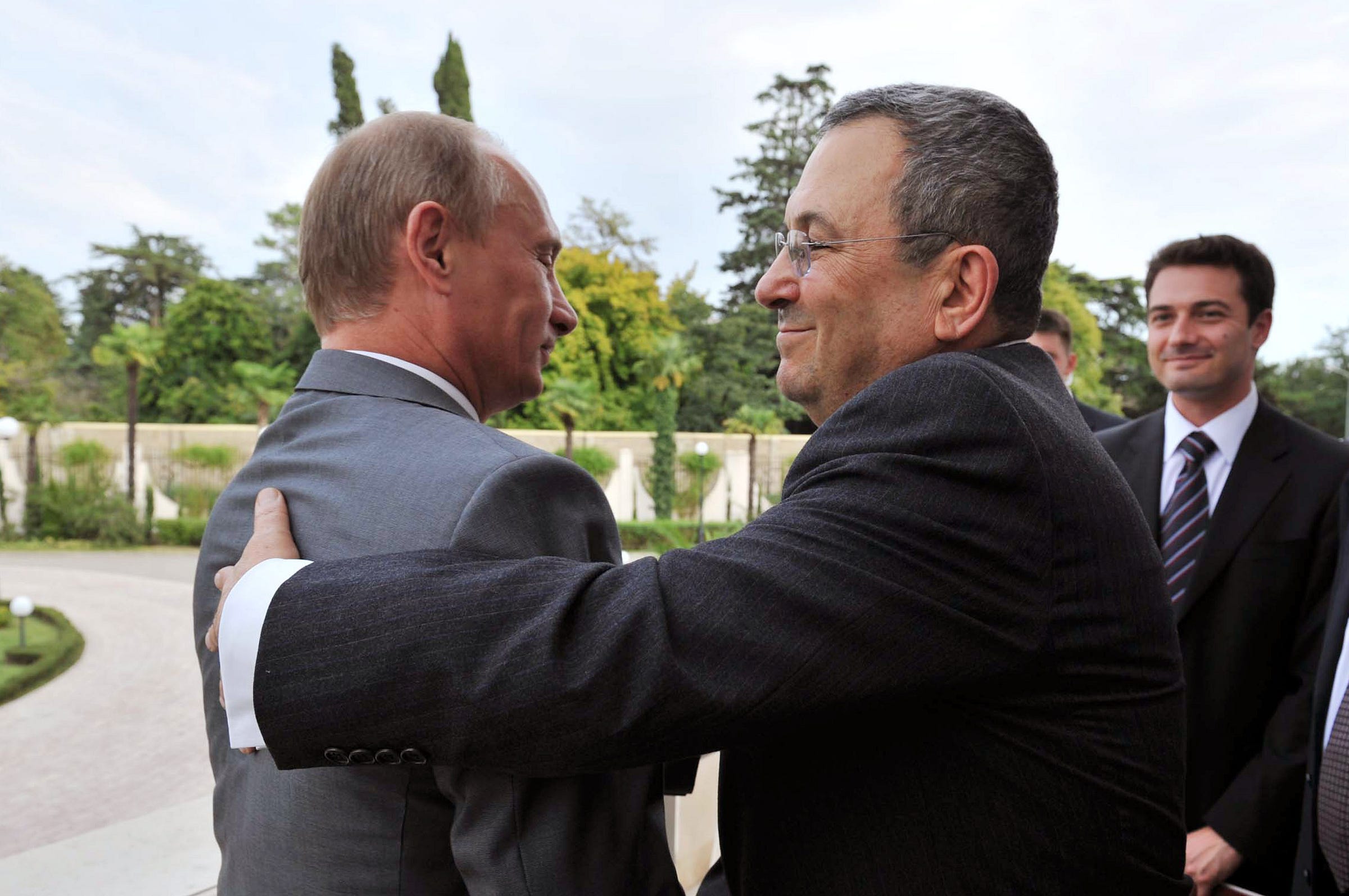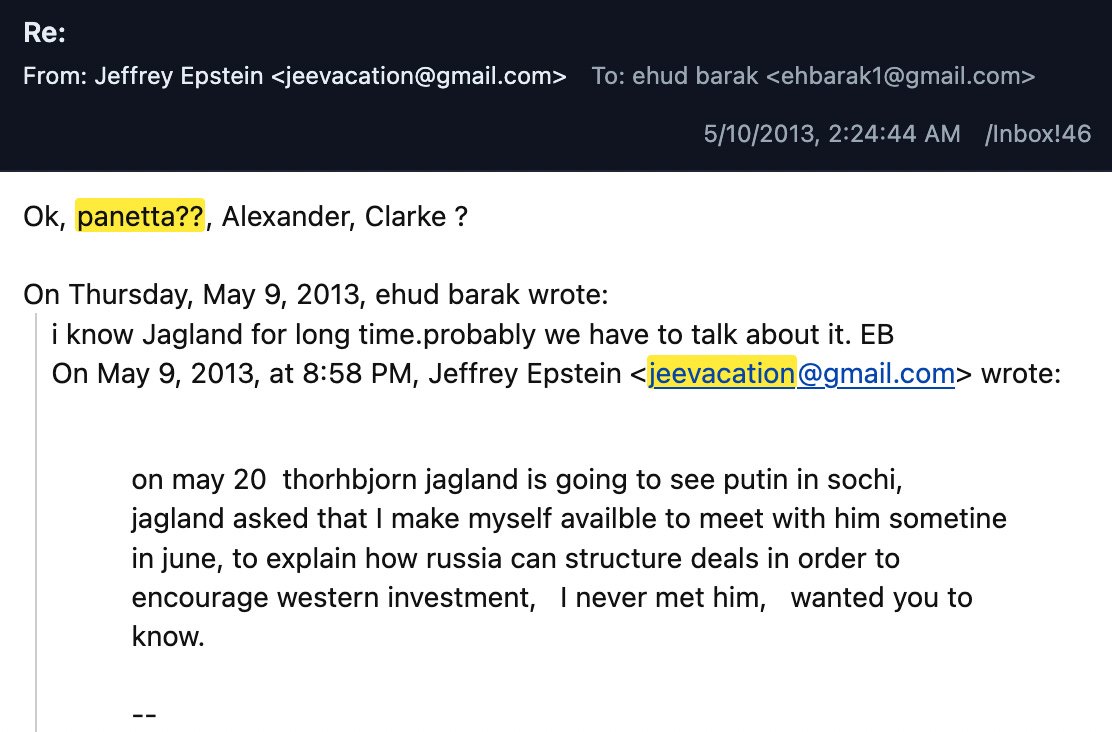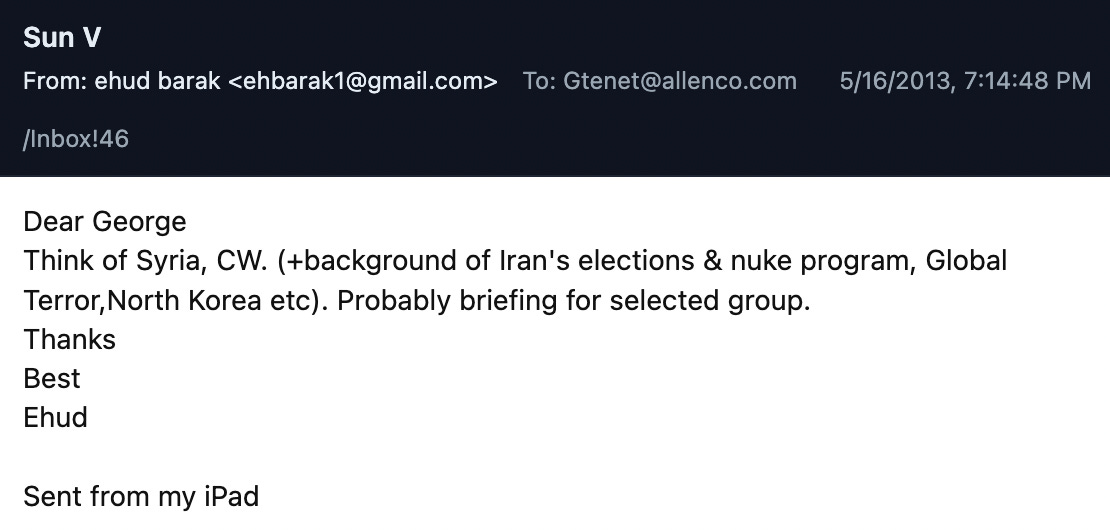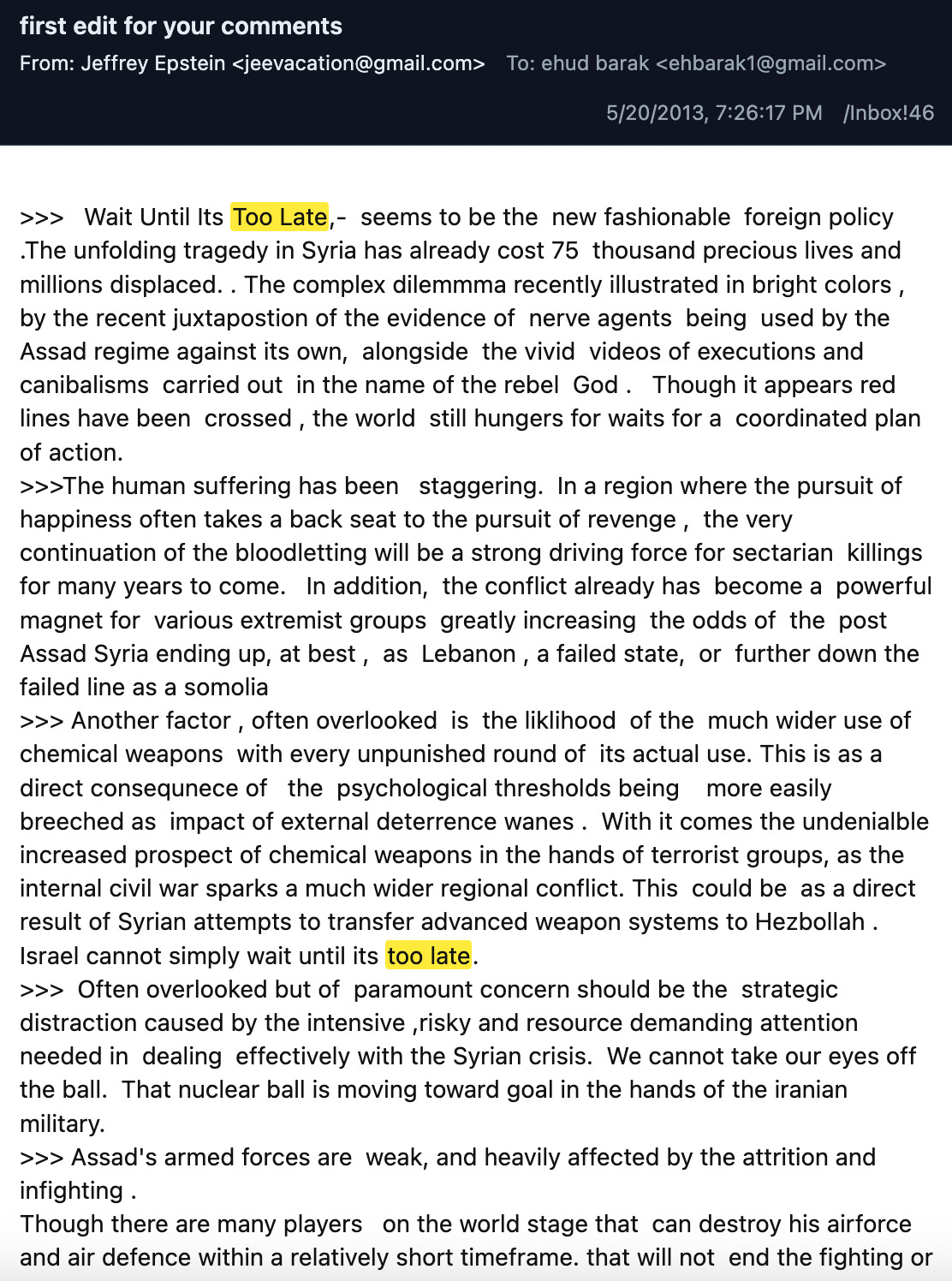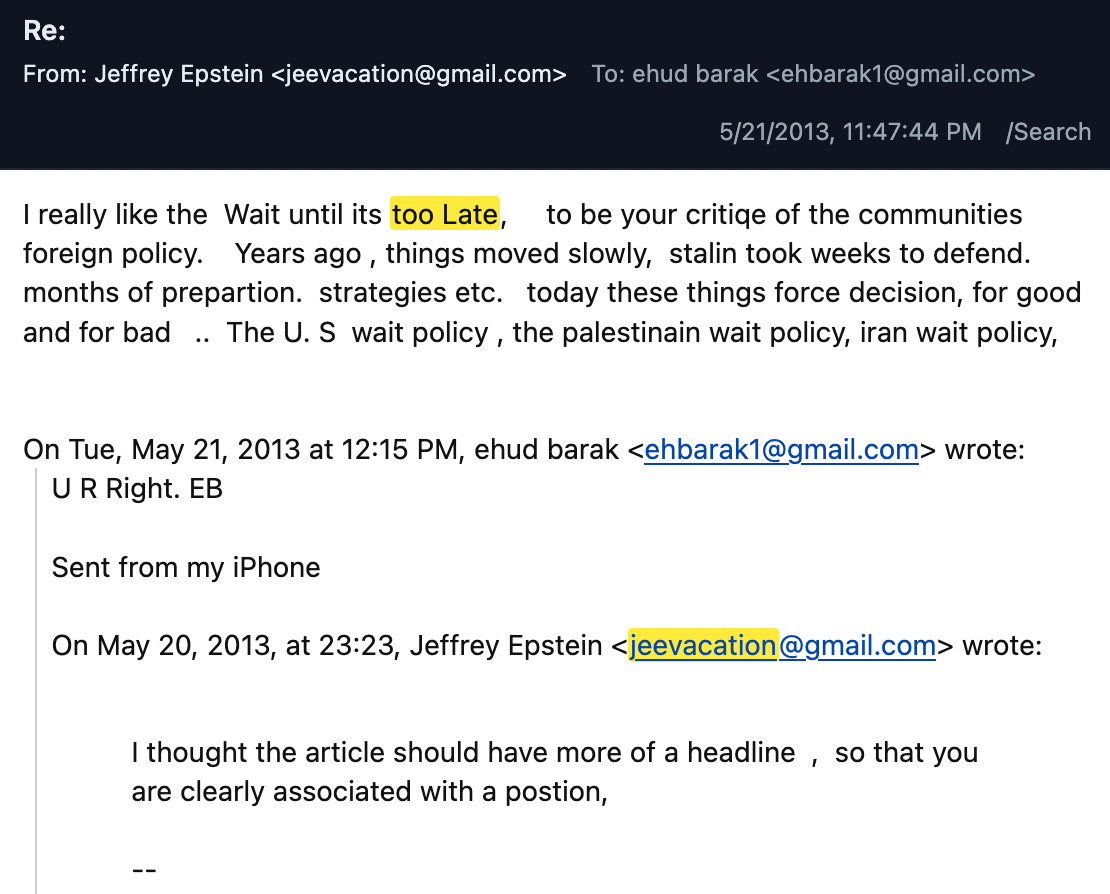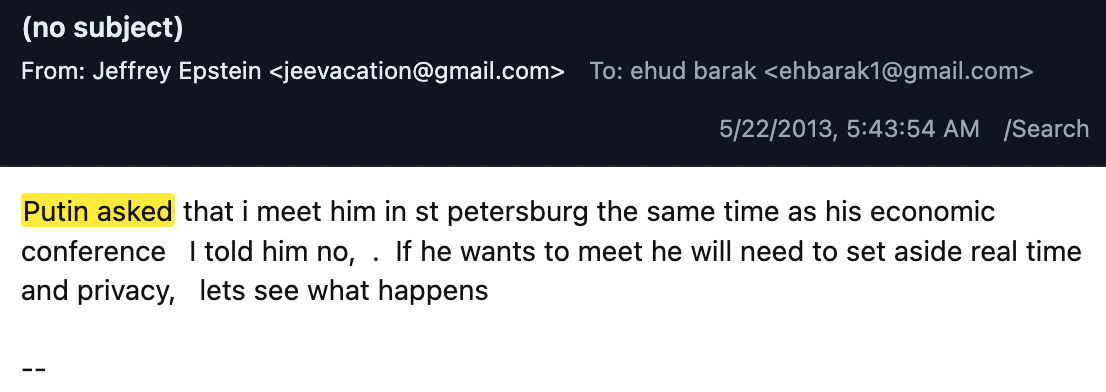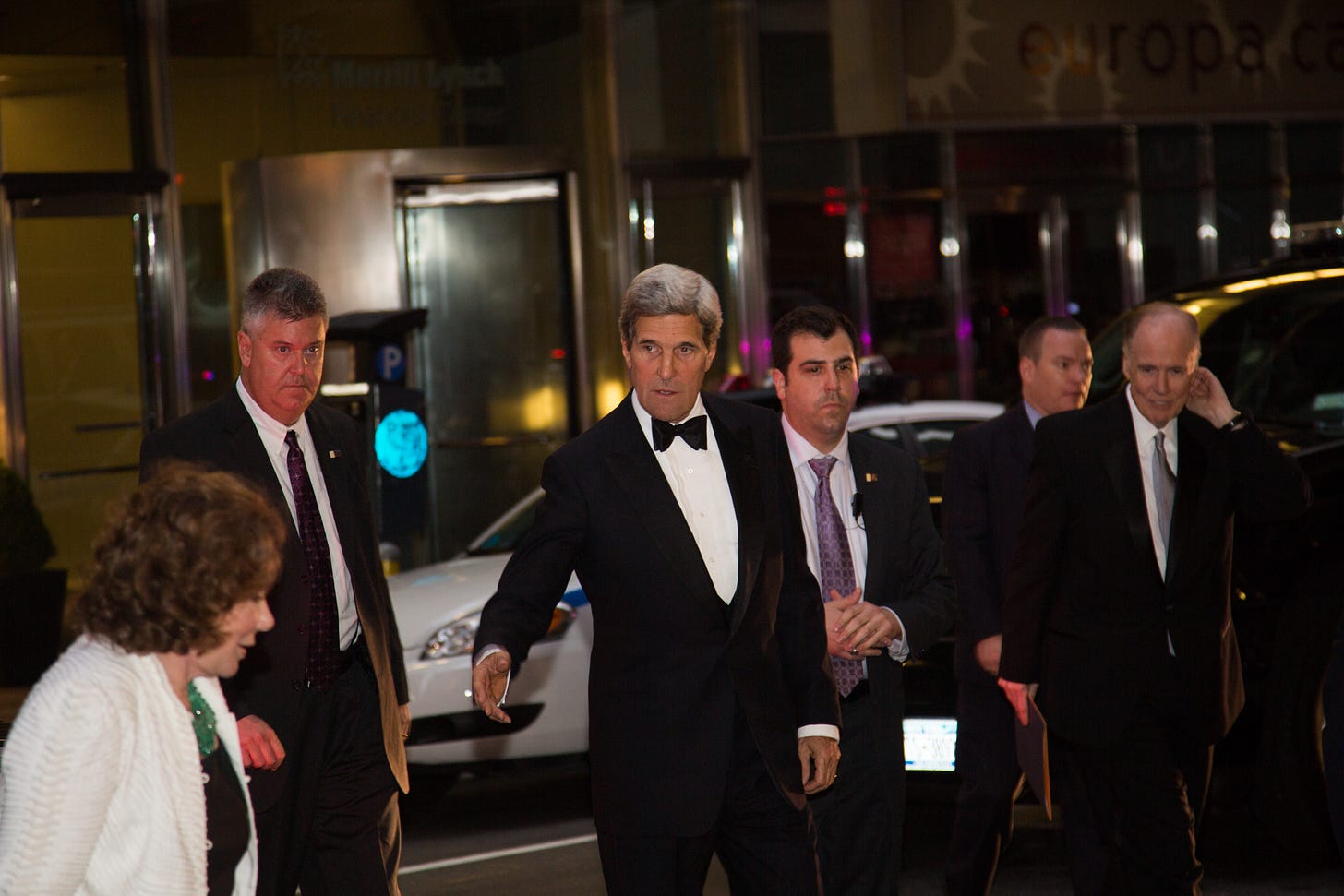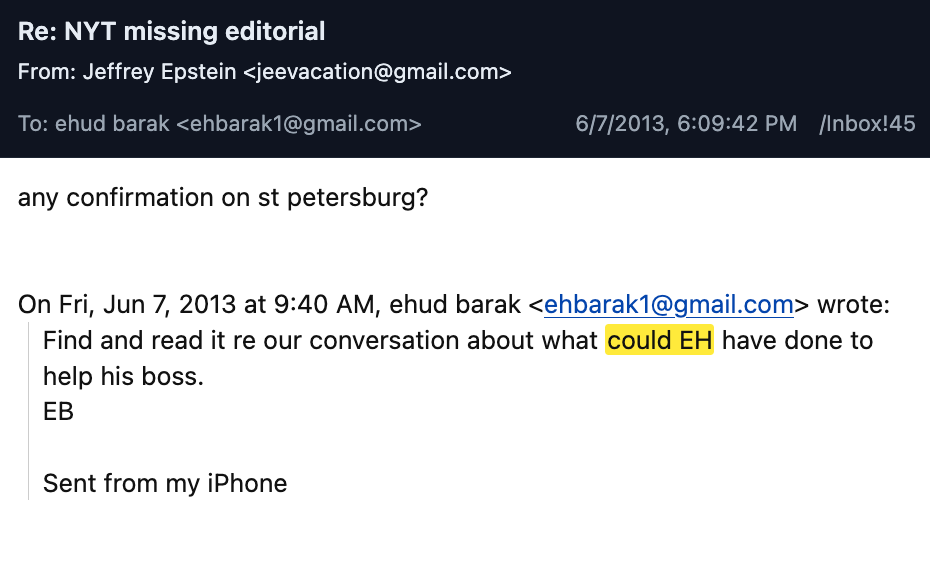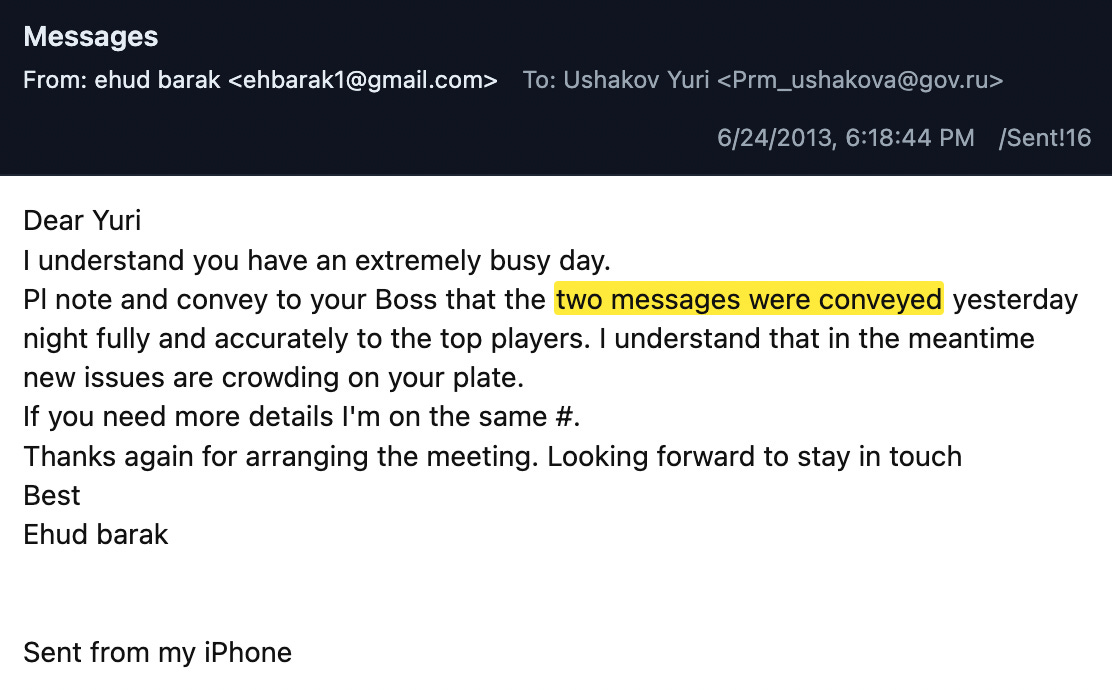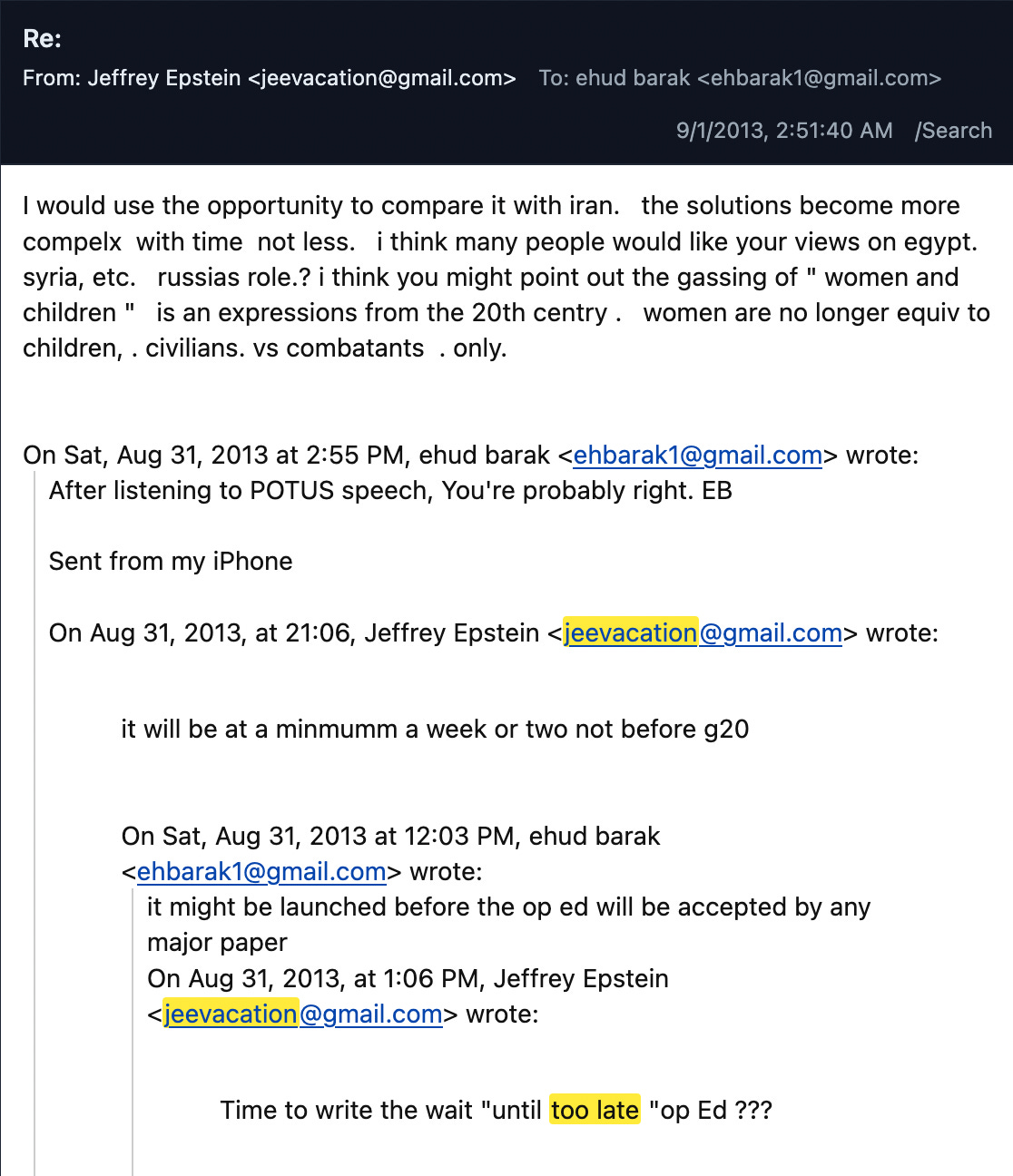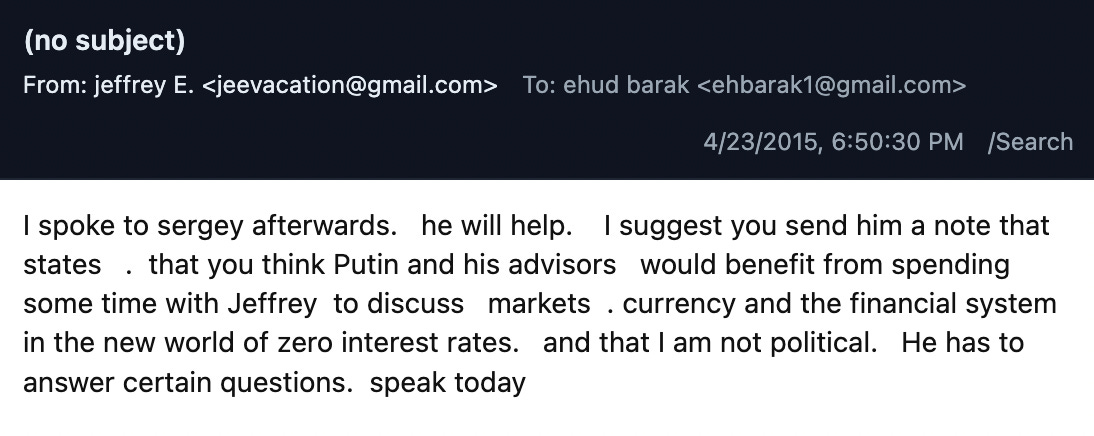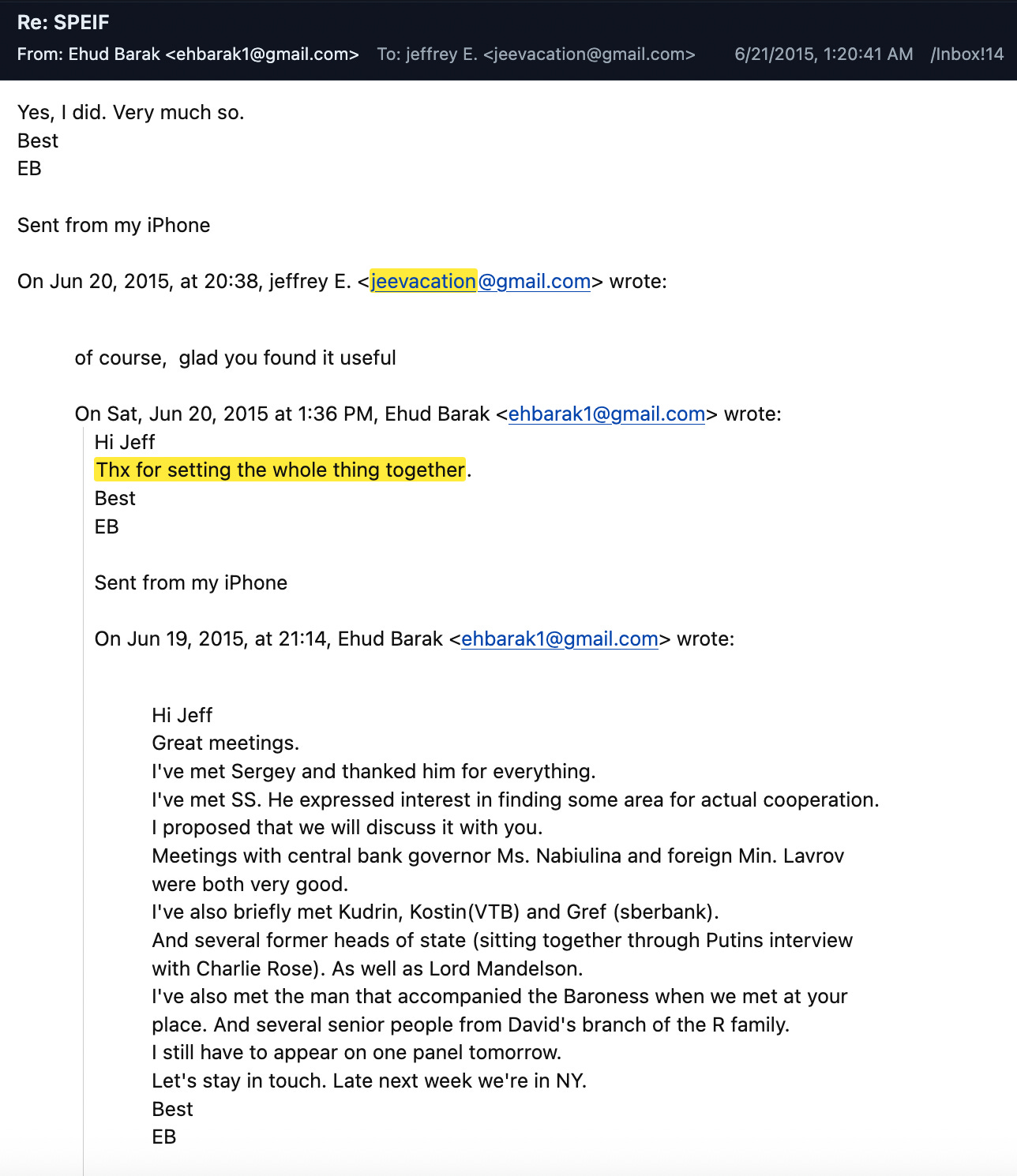Russian Prime Minister Vladimir Putin shakes hands with Israeli Defense Minister Ehud Barak as they meet September 6, 2010 in Sochi, Russia. Handout photo by Ariel Hermoni/ Israeli Defense Ministry via Getty Images.
Jeffrey Epstein facilitated efforts to open a backchannel between Israel and the Kremlin during the Syrian civil war, according to leaked emails from former Israeli Prime Minister Ehud Barak.
The trove of emails, exchanged at the height of the Syrian civil war between 2013 and 2016, reveal Epstein’s successful efforts to secure a private meeting between Barak and Russian President Vladimir Putin to discuss a Russian-brokered end to the conflict, including winning Russian support for a negotiated removal of Syrian President Bashar al-Assad.
Epstein was an invaluable resource for Israel’s former prime minister, who also served as head of intelligence and defense minister throughout his career, sharing whispers from within Russian elite circles and intel on Putin’s interlocutors in Europe and the U.S—and even advising him on how to engage with the Mossad. Barak, fresh out of his role as Israeli defense minister, built a deep portfolio of investments and business relationships around the world with Epstein’s help.
On February 21, 2014, Epstein wrote to Barak, “with civil unrest exploding in ukraine syria, somolia [sic], libya, and the desperation of those in power, isn’t this perfect for you.” Barak replied: “You’re right [in] a way. But not simple to transform it into a cash flow. A subject for Saturday.”
These efforts also provided cover for covert diplomacy on behalf of the Israeli government. Together, Barak and Epstein sought to pressure the Obama administration to either intervene directly in the Syrian war, or make concessions to the Kremlin in exchange for Assad’s graceful exit. In their exchanges, Epstein expressed his frustration at the Obama administration’s failures to contain Tehran, as the two men searched for opportunities to promote U.S. strikes on Iran.
Despite securing a sit-down with Putin in the summer of 2013, they did not succeed in convincing Russia to support Assad’s ouster, but their negotiations set the stage for U.S.-Russia cooperation on disarmament of Syria’s chemical weapons arsenal a few months later.
Michael Oren, former Israeli ambassador to the U.S., wrote in his memoir that Israel’s diplomatic leadership was told to “avoid being perceived as a player” in Syria. Clandestine actors sought to shape agendas in Moscow and Washington, while Israeli officials denied involvement and used the media to legitimize “red lines” for air strikes inside Syria.
After their failed attempt to remove Assad, Barak and Epstein sought to leverage the Russian channel again in 2015, as Barak pushed for U.S. strikes on Iran and rejected Obama’s nuclear deal framework. Barak failed to convince the Obama administration to change course. The plot, nevertheless, illustrated Epstein’s knack for steering the superpowers toward Israel’s interests by leveraging a social network that intersected the Israeli, American, and Russian intelligence communities.
The leaked emails come from the same archive previously reported by Drop Site—materials released by the hackers known as Handala and disseminated by Distributed Denial of Secrets. The emails include extensive, previously unpublished documents and photographs from Barak’s inner circle including non-public information verified as accurate by Drop Site. Many documents from the Handala hack were independently validated by records released by the U.S. House Oversight Committee this month.
Our ongoing series reveals how Epstein used elite networks and quasi-official institutions to promote Israeli security interests and enrich his circle of friends and companions. This story follows the same pattern, with the highest of stakes: a chaotic war on Israel’s ever-expanding border, and the balance of power between the United States and Russia.
Barak did not respond to a request for comment. Epstein died in jail in New York during the first Trump administration. The news outlet The (b)(7)(D) previously reported on some of the correspondence.
Stories like this are not easy to do and are only possible with the support of readers. Consider a 501©(3) tax-deductible donation today.
Support Drop Site; Make a Contribution
“The Kremlin Holds the Keys”
In the early hours of May 9, 2013, former Israeli prime minister Ehud Barak emailed his close friend Jeffrey Epstein with an urgent message. “R U awake? if yes, pl call,” Barak wrote Epstein, at 1 a.m. in New York. Shortly after they spoke, Barak emailed again to ask Epstein to keep their conversation private: “jeff pl don’t share the info with any of our friends.”
Epstein replied: “Of course not. I think you should let Putin know you will be in Moscow. See if he wants private time.”
Barak and Epstein built a backchannel to Putin in hopes of winning Russia’s support to remove Syrian president Bashar al-Assad from power, according to leaked emails from Barak’s inbox. Before approaching Putin, Barak and Epstein sought to use one of the major American newspapers to frame Israel’s narrative about the Syrian war, and telegraph a framework for peace talks led by the United States and Russia.
That spring, the Syrian civil war entered its third year. A popular uprising against the Assad regime had rapidly devolved into a brutal sectarian conflict fueled by foreign powers. The flow of Russian and Iranian weapons inside Syria and the threat of their diversion to Israel’s enemies were among Israel’s top security priorities.
Since the early days of the war, Israeli security leaders believed Assad’s downfall was imminent. Barak, then serving as Israel’s Defense Minister, told the Washington Post in December 2011 that Assad’s fall was “inevitable,” and a matter of “weeks…not a matter of months or years.”
More than a year later, Barak’s prediction had still not come true. With Russia and Iran’s support, Assad stubbornly clung to power. Israeli officials, recognizing the need to engage Russia, visited Moscow in January 2013 to discuss concerns about Syria’s chemical weapons stockpile falling into the hands of Hezbollah in Lebanon or Sunni militants linked to al-Qaeda.
Meanwhile, Israel escalated its operations within Syria’s borders. In late January, the Israeli air force conducted an airstrike on Damascus intended to halt the transfer of surface-to-air missiles to Hezbollah. Barak postured about the strikes at a security conference the following month: “When we say something we mean it.” He re-iterated his assertion that Assad’s fall “is coming imminently,” and when it happens, “this will be a major blow to the Iranians and Hezbollah.”
But Assad still refused to bend, and Hezbollah’s strategic gains on Israel’s borders increased the pressure to remove Iran’s man in Damascus. Rapprochement with the Kremlin offered a solution.
Barak stepped down from his post in March 2013 after the failure of his new political party to contest Knesset elections. His retirement from formal office, he said, meant that he now would have time to “study, write, live and enjoy.” Instead, he immediately began working with Epstein to conduct covert diplomatic work in support of Israeli security interests abroad.
The key to Barak’s backchannel diplomacy with Russia was his relationship with Viktor Vekselberg, a Russian-Israeli oligarch and owner of the multinational conglomerate Renova Group. Barak offered his services as a strategic consultant to Renova, a position that would generate a lucrative salary for himself and further his ambitions in the global mining and energy sectors, while enhancing his access to powerful figures in the Russian elite.
Barak kept Epstein abreast of every update on his courtship with Vekselberg. As Barak progressed toward a formal agreement with Renova, Epstein counseled Barak on contract negotiations, writing on April 27, “I think you should propose all up front. no need for a written agreement. until later.”
Beneath the surface of mundane contract details, Epstein and Barak worked on a covert plan with the support of Israeli intelligence—regime change in Damascus.
The Israeli military strategist, often described as “emotionally handicapped,” relied on Epstein to help him craft his messaging when dealing with other political officials and business elites. Epstein, for instance, asked Barak to wait until they could speak privately before Barak notified intelligence leaders of a deal with Vekselberg: “do not go to number 1 too quickly, I understnad more now so we should speak.” The euphemism “number 1” is a moniker used to refer to the head of the Mossad, dating back to Barak’s days as director of Israeli military intelligence, when the Mossad director’s identity was kept secret.
As the Renova contract was being finalized—a $1 million advance and a $1 million quarterly retainer—Barak planned a trip to Moscow on May 12 to meet with Vekselberg.
A few hours after Barak informed Epstein of his Moscow plans, Epstein shared some intelligence about one of Putin’s interlocutors, the head of the Council of Europe: “on may 20 [thorbjorn] jagland is going to see putin in sochi, jagland asked that I make myself availble to meet with him sometine in june, to explain how russia can structure deals in order to encourage western investment, I never met him, wanted you to know.” Barak, who was working closely with Epstein to cut deals in the Eurasian energy sector, wrote back: “i know Jagland for long time. probably we have to talk about it.”
Epstein responded with a short list of past and present American national security leaders who, his response implied, could also be useful in Russia talks. He wrote, “Ok, panetta??, Alexander, Clarke?”—likely referring to Secretary of Defense Leon Panetta, NSA Director Keith Alexander, and Cybersecurity Czar Richard Clarke.
Email exchange between Epstein and Barak, May 9 and 10, 2013.
Upon his return from Moscow, Barak contacted George Tenet, former director of the CIA, to pitch a talk he (Barak) could give at Allen & Company’s Sun Valley event in July—a “summer camp” for billionaires and elite politicians to convene and negotiate deals. The topic? “Think of Syria, CW. (+background of Iran’s elections & nuke program, Global Terror, North Korea etc). Probably briefing for selected group.” Barak was not recorded on the guest list.
Email sent by Barak to George Tenet, May 16, 2013.
In the meantime, Epstein and Barak crafted an op-ed for Barak to publish that could shape the narrative for a Russian-led transition in Syria that secured Israel’s interests.
On May 19, Barak sent Epstein a draft titled “The Kremlin Holds the Keys,” which argued that Assad’s regime had permanently lost its legitimacy, and Russia should take leadership to negotiate a swift end to the war, or see “years of bloody massacres…in a ‘no man’s land’ Syria.” A “post-Assad” Syria, wrote Barak, was a foregone conclusion; it was now up to Russia to decide whether or not to “convince Assad to leave,” or prolong the war.
Barak’s editorial proposed that the U.S. and its allies should accept a “price” for a Russia-led solution to the war. He acknowledged that removing Assad from power should not compromise Russia’s “interests and perspectives” in Syria—namely, Russia’s deep ties within the Syrian security apparatus, and its access to naval bases at Tartus and Latakia. He framed the chemical weapons threat as a decisive issue requiring initiative by the Russians, who knew “the generals of the chemical weapons units on a first name basis.”
The backdrop of Barak’s editorial was Russia’s looming delivery of advanced weapons systems to Syria, including anti-ship missiles and advanced air defenses, which threatened to further entrench Israel’s enemies. In the weeks prior, Israel began escalating its operations inside Syria, conducting more air strikes on Damascus to block Iranian missiles bound for Hezbollah; Russia responded by sending its warships into the Mediterranean.
Barak felt enormous urgency to secure a face-to-face meeting with Putin as soon as possible, before the conflict escalated further. Besides Epstein, he also requested comments from Ron Dermer, close confidante to Prime Minister Benjamin Netanyahu, who was preparing to become Israel’s next ambassador to the U.S. Barak wrote to Dermer, “i don’t care how you’ve corrected it. yours will be always better in clarity and conciseness than mine. try earlier. i don’t want events to overwhelm us.” Dermer swiftly returned a refined copy with more fluent English.
As was typical of Epstein’s style, he sent back a rough cut riddled with spelling and grammatical errors. Unlike Dermer’s narrower cut, Epstein significantly revised Barak’s piece, and added a new title: “Wait Until It’s Too Late.” Epstein’s draft was more forceful and polemical, scolding the U.S. for failing to act, and adding an unambiguous statement of Israel’s national interest that was absent in Barak’s draft: “Israel cannot simply wait until it’s too late.”
Epstein’s edited draft of Barak’s op-ed, May 20, 2013.
Epstein did indeed wait until it was too late to send his edits; Barak wrote back: “Unfortunately we came to a deadline and had to sent somewhat less brilliant text. I hope one of the big three will buy it.”
The New York Times rejected Barak’s editorial. The Times’s international opinion editor wrote: “We are potentially interested but we feel that the key part of the piece is left vague. Proposing a Russian-mediated solution is only an appealing op-ed for us if the mechanics are spelled out. Barak is a military man and an experienced negotiator so I have no doubt he has something specific in mind…What does he think the price will be? What is the Russian incentive to budge now?”
Epstein had conveyed a similar criticism of Barak’s draft: “I thought the article should have more of a headline, so that you are clearly associated with a [position].” After the rejection from NYT, Barak wrote Epstein back: “U R Right.”
Epstein then expanded on his own aggressive view, arguing that the U.S. was waiting too long to intervene when it came to Palestinians and Iran: “I really like the Wait until its too Late, to be your critiqe of the communities foreign policy. Years ago , things moved slowly, stalin took weeks to defend. months of prepartion. strategies etc. today these things force decision, for good and for bad … The U. S wait policy , the palestinain wait policy, iran wait policy,”.
Email exchange between Epstein and Barak, May 20 and 21, 2013.
Barak decided not to address the specific questions posed by the NYT editor. He wrote to his spokesman on May 21: “tell them they can get a full description of answers to all their questions in a different piece…not now because it will empty the main message.” The Times rejection was followed by rejections from Washington Post and The Wall Street Journal. The op-ed was eventually published, without Epstein’s changes, in The Telegraph on May 30, 2013.
“The messages were conveyed to the top players”
Upon returning to the Russian presidency in May 2012, Putin sought to neutralize widespread street protests which, he claimed, were fomented by external agents funded by U.S.-backed NGOs. Putin had a longstanding, mutually hostile relationship to the Clinton family. The protests against his election, which he pinned squarely on the shoulders of the Secretary of State Hillary Clinton, ratcheted those tensions ever higher, foreshadowing a contest that would consume American politics in the years to come.
Watching the collapsing governments of the so-called “Arab Spring” from afar, and seeking to prevent a similar “color revolution” in Russia, Putin began a balancing act of centralizing political and economic authority while preserving channels for foreign capital investment. Epstein, close with former President Bill Clinton, had a role to play.
Epstein once bragged to a journalist that he “often flew to Moscow to see Vladimir Putin,” and enjoyed close ties with Russian business and political elites. The American financier specialized in moving money across borders, and his expertise would be useful in stemming capital flight from Russia amid Putin’s crackdown on “foreign agents.”
On May 22, 2013, Epstein informed Barak he’d received—and rejected—an invitation to meet with Putin at the St. Petersburg International Economic Forum the next month: “Putin asked that i meet him in st petersburg the same time as his economic conference…i told him no, . If he wants to meet he will need to set aside real time and privacy.”
Email from Epstein to Barak, May 22, 2013.
Barak found his own official reason to attend the conference: supporting a technology incubator in Moscow led by Vekselberg. The Kremlin was threatening to cut funding for the Skolkovo Innovation Center — Russia’s “Silicon Valley,” which Renova was heavily involved in developing.
Renova sent Barak an email with talking points to discuss in St. Petersburg and included the contact information for Putin’s foreign policy aide, Yury Ushakov, which Barak could use to request face-time with the president.
Barak reached out to Putin’s aide two days later, on May 26, to request a meeting with Putin in St. Petersburg just prior to the conference. “I would like to meet with President Putin for 30-40min at an early opportunity. Preferably before the main June Events,” Barak wrote, adding, “I’m fully aware of the intense burden on the President’s schedule these days, but I urge you to draw the President’s attention to my request.”
Epstein was eager to get an update about the Russians’ reply, and he emailed to confirm if Barak was coming to Henry Kissinger’s 90th birthday party in New York on June 3, 2013. That event would also be attended by U.S. Secretary of State John Kerry, the lead broker for U.S. policy on Syria and Iran. Barak replied: “I’ll attend Dr. K birthday. Re Putin I’ll talk to you later.”
John Kerry arrives at Henry Kissinger’s birthday party at St. Regis Hotel on June 3, 2013. Photo by Scott Rudd/WWD/Penske Media via Getty Images.
Ushakov’s chief of staff acknowledged Barak’s message on June 5, and passed along Ushakov’s direct phone number to coordinate the meeting details.
Then, on June 7, the first of Edward Snowden’s bombshell revelations on the NSA dragnet PRISM surveillance was published, casting a shadow over Barak and Epstein’s planning. Barak sent Epstein an email with subject line “NYT missing editorial,” referring to The New York Times editorial board’s “President Obama’s Dragnet,” a scathing piece on the PRISM revelations that day.
The two men recognized the Snowden leaks could undermine the Obama administration’s leverage in negotiations with Putin. Barak asked Epstein to read the article, in which the NYT editors claimed the president had “lost all credibility” by abusing his executive powers. Barak wrote, “Find and read it re our conversation about what could EH [attorney general Eric Holder] have done to help his boss.” Epstein replied: “any confirmation on st petersburg?”
Email exchange between Epstein and Barak, June 7, 2013.
Despite making contact with Ushakov, Barak’s consulting company Hyperion had still not been registered for the conference. On June 10, Barak emailed Boris Collardi, CEO of Julius Baer, a Swiss private bank where he was also an advisor: “I need your office help. Russia is not yet orderly run place. I’ve got an official confirmation of a meeting with Putin but Hyperion’s registration file had not yet confirmed. Probably they never heard the name. I think that if JB will approach the organizing body […] on my behalf they will conclude it within hours.”
With Julius Baer’s help, Barak swiftly locked in his appointment. In less than 24 hours, Ushakov’s office confirmed the appointment time. Barak wrote back, trying to convey the urgency and importance of the meeting: “I’d never spent the time of the President and won’t do it now. The meeting IS important. So make sure it’s done during the SPEIF.”
The same week, Israeli intelligence officials used official channels to engage with other stakeholders in Syria, as Mossad director Tamir Pardo arrived in Ankara for talks with Turkish spy chief Hakan Fidan.
On June 12, Epstein sent Barak another piece of intelligence to prepare him for the meeting in St. Petersburg: “putin will re do his staff in the summer. bringing only very trusted people closer… more info on phone or face to face.”
Putin’s meeting with Barak was not logged on any SPIEF event calendars for the SPIEF conference. But Barak’s emails confirm a meeting scheduled for the evening of June 20, and a Russian journalist saw Barak waiting to speak with Putin again late in the evening of June 21, after Angela Merkel’s visit to the Hermitage.
On June 24, Barak sent an email back to Ushakov, reporting that the backchannel communication was successful. Barak confirmed that messages from Putin had been transmitted to relevant parties: “[Please] note and convey to your Boss that the two messages were conveyed yesterday night fully and accurately to the top players.” Barak’s email did not specify the identities of the players or the content of the messages.
The previous day, Edward Snowden arrived at Moscow’s Sheremetyevo Airport to seek asylum. Barak acknowledged Ushakov’s difficult position, and invited him to follow up later. “I understand that in the meantime new issues are crowding on your plate,” Barak wrote. If you need more details I’m on the same #.”
Email from Barak to Yuri Ushakov, June 24, 2013.
“Getting Authorization Now For Iran”
Two months after the St. Petersburg conference, on August 21, 2013, opposition-controlled areas in Ghouta, Syria were struck by rockets containing sarin gas, killing and injuring thousands in the suburbs of Damascus. Ten days later, President Obama delivered a speech at the Rose Garden of the White House, announcing he’d seek congressional authorization for U.S. strikes on Syria, enforcing the “red line” he had drawn exactly one year prior.
Epstein emailed Barak as soon as news of Obama’s speech broke, on August 31, to propose publishing his shelved Syria narrative: “Time to write the wait ‘until too late’ op Ed ???” Barak responded, solemnly: “[U.S. strikes] might be launched before the op ed will be accepted by any major paper.” Epstein disagreed, suggesting any action would likely occur after the G20 summit on September 5, and Congress’s return the week after: “it will be at minmumm a week or two not before g20.” An hour later, Barak agreed: “After listening to POTUS speech, You’re probably right.”
Email exchange between Epstein and Barak, August 31 and September 1, 2013.
In the same email thread, Epstein offered Barak guidance on how to ratchet the pressure on the U.S. to strike Iran: “I would use the opportunity to compare it with iran. The solutions become more compelx with time not less. i think many people would like your views on egypt. syria, etc. russias role.? i think you might point out the gassing of ‘women and children’ is an expressions from the 20th centry. women are no longer equiv to children,. civilians. vs combatants . only.”
Epstein wished Congress would approve bombing Iran after bombing Syria, writing, “hopefully someone suggests getting authorization now for Iran. the congress woudl do it.” Barak did not draft or publish an op-ed on Epstein’s proposed theme at that time.
On September 9, 2013, U.S. Secretary of State John Kerry floated the idea that Assad could avert strikes by surrendering “every single bit” of chemical weapons.
Reporters regarded Kerry’s comment as an “off-hand remark” or a gaffe, and a U.S. State Department spokeswoman tried to brush it off as a rhetorical comment. But Russian foreign minister Sergei Lavrov took the statement seriously, and offered a plan to peacefully impose international control over Assad’s stockpile. The next day, Obama expressed his approval of Lavrov’s proposal to avoid the use of force.
Putin published an op-ed in the New York Times, “A Plea For Caution,” attempting to sell the same solution to the American public. “It is alarming that military intervention in internal conflicts in foreign countries has become commonplace for the United States,” he wrote. “Is it in America’s long-term interest? I doubt it. Millions around the world increasingly see America not as a model of democracy but as relying solely on brute force, cobbling coalitions together under the slogan ‘you’re either with us or against us.’”
U.S. and Israeli positions rapidly converged toward an international framework for regime change that resembled Barak’s proposal, using chemical weapons disarmament as an on-ramp to a “transitional government” backed by the United Nations.
Israel’s ambassador to the U.S. explicitly called on the international community to remove Assad. Michael Oren told The Jerusalem Post, “We always preferred the bad guys who weren’t backed by Iran to the bad guys who were backed by Iran.” At the end of September, Oren stepped down from his ambassador post, replaced by Dermer—the silent editor of Barak’s summer op-ed. The UN mission to destroy Syria’s stockpile began in October, and UN secretary-general Ban Ki-Moon announced Russia-sponsored peace talks in Geneva soon after.
Russia became the indispensable broker after the Ghouta attack, exactly as Barak urged. But, in spite of the disarmament effort, the parallel peace talks in Geneva stalled out almost immediately over the question of Assad’s future. As a pre-condition for joining the Geneva talks, Kerry demanded Iran agree to Assad’s removal and a transitional government; Iran refused, and the peace process fell apart before it began. The U.S. and Israel ultimately accepted a Russia-led solution on chemical weapons, but failed to remove Assad from power.
“I am not political”
Jeffrey Epstein portrayed himself as an “apolitical” financier. But the backchannel diplomacy in Russia reveals him as a political “fixer” who arranged access to senior Russian political figures with the goal of advancing Israeli national security interests, often in direct contradiction to the United States’ national security strategy.
In April 2015, the U.S. and Iran agreed on a nuclear deal framework in Lausanne, Switzerland, a development that cut against the preferences of the Israeli government, as well as Epstein’s own expressed hopes for a U.S. attack on Iran. TIME magazine asked Barak to write an editorial on the subject. In his essay “Iran Has Escaped a Noose,” Barak argued that only tough sanctions and military force could restrain Tehran, and sanctions would become difficult to reassemble after a deal was signed.
Barak suggested instead a “surgical strike” on Iranian nuclear facilities, to set Iran “five years backward” and deter future cheating. “The possibility [of strikes] should not be rhetorically holstered,” he wrote, “It may, finally, later down the stream be the only language Iran understands.”
He sent the article to Epstein shortly after it was published, and asked to speak on the phone. The same day, he sent a video of Bill Clinton discussing negotiations over North Korea’s nuclear program in 1994. Barak wrote a note about Clinton’s video in an email to another colleague: “Obama is highly vulnerable among Democrats on the Iran issue…Clinton 21yrs ago…talked of North Korea but exactly the same words. NK is now a nuclear player.”
Barak once again leaned on Epstein to get a line to Moscow before the Iran nuclear deal was finalized. He visited New York City from April 21 to April 24, where received Epstein’s help to once again attend the St. Petersburg International Economic Forum that summer. Epstein connected Barak to Sergey Belyakov, a former Russian economic minister with ties to Russian intelligence, to help Barak get an invitation and set up meetings with senior Russian officials. Epstein also directed Barak to convey that senior Russian officials including Putin should also contact Epstein directly for meetings.
Epstein wrote on April 23, 2015: “I spoke to sergey…he will help. I suggest you send him a note that states that you think Putin and his advisors would benefit from spending some time with Jeffrey to discuss markets currency and the financial system in the new world of zero interest rates. and that I am not political. He has to answer certain questions.” Epstein’s request to again add Barak came as the Israeli government was attempting to manage an increasingly delicate balancing act in its ties with Moscow and Washington. He added: “when you receive the list [of Russians] from sergey, he asked that we prioritze who we would find most interesting.”
Email from Epstein to Barak, April 23, 2015.
As promised, Belyakov delivered Barak a formal invitation to speak on a panel at SPIEF, and a list of important names for Barak’s consideration. In St. Petersburg in June 2015, Barak met with Russian foreign minister Sergei Lavrov, Central Bank governor Elvira Nabiulina, and other Russian elites.
Epstein was not merely a fixer for Barak, but also a friend and advisor, who collaborated with him at high-levels to promote Israeli security interests. The correspondence between Barak and Epstein, as well as publicly released information about Epstein’s travel and activities during this period, point to a significant degree of collaboration between the two men, involving numerous governments in negotiations intended to serve Israeli security interests. In a note sent by Barak to Epstein after the St. Petersburg forum in 2015, he rattled off a long list of heads of state, senior officials, and business magnates he had met, reporting “great meetings” with all.
Around the same time, Epstein was known to have conducted meetings with several Obama administration officials, including former U.S. ambassador to Russia, and later CIA chief William Burns, as well as Obama White House counsel Kathryn Ruemmler. While shedding light on his efforts with Barak to secure Israeli interests in Syria, the emails leave open the question of other interactions that Epstein may have engaged in with U.S. and other government officials.
While the collaboration between the two men did not depose Assad or trigger a U.S. attack on Iran, the negotiated outcome in Syria did reduce the perceived threat to Israel. They also succeeded in opening a diplomatic channel between Moscow and Tel Aviv that would be vital to the next decade of war. Epstein had also helped make Barak a wealthy man shortly after he left his role as defense minister, in a collaboration that would last for years.
A day after sending his summary of the St. Petersburg trip, Barak messaged Epstein again to re-affirm his gratitude: “Thx for setting the whole thing together.”
Email exchanged between Epstein and Barak, June 19-21, 2015.
From Drop Site News via this RSS feed


